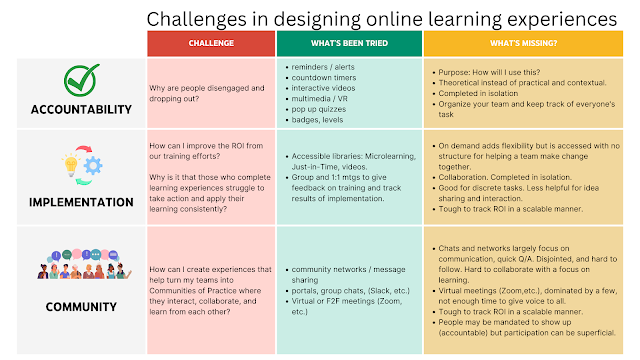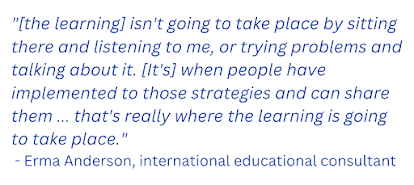We all agree on the power of social learning. If teams are going to improve, they need to improve together.
Yet, we continually hear of three problems within online learning experiences.
1. Accountability: Learners struggle to complete learning/training modules. Why are people disengaged and dropping out?
2. Implementation: There is a gap between training (learning) and action. How can I improve the ROI from our training efforts? Why is it that those who complete learning experiences struggle to take action and apply their learning?
3. Community: Learning is usually set up as an isolating experience supplemented by Zoom or face-to-face meetings to try to share - which seldom provide the time and space to give a voice to each learner and provide deeper, more actionable sharing and feedback. How can I create experiences that help turn my teams into Communities of Practice where they interact, collaborate, and learn from each other?
These 3 problems are related. Take a look at what happens when we achieve one without the other two.
It's no mistake that the implementation gap sits between the other two. Learning should start from a place of relevance - what is the learner meant to do with the aquired knowledge and skills? Unfortunately, many learning experiences start (and stop!) with the goal of measuring comprehension: "What does the learner know?" If that's our goal, then it's fairly easy to measure with a quiz. But the nature of the learning is passive; The experience loses relevance to the learner and we see the inevitable "implementation gap" where skills are "taught" and "comprehended" but struggle to be applied effectively.
Coincidentally, that same starting point is the reason so many teams and organizations struggle with building a true learning community. If training is passive and focused on comprehension, there is little intrinsic desire to interact with my peers. I don't really care how someone else scored on a quiz or summarized their understanding. That's the reason why simply adding collaboration tools (group chats, Slack channels, Zoom meetings, etc.) doesn't get to the heart of an interactive learning community. These tools facilitate quick communication for logistics and quick questions, but they struggle to help really us to collaborate and brainstorm by sharing solutions and feedback.What's needed are learning experiences that are less about information sharing and more about taking collaborative action by doing.
As international educational consultant (and Huddle Up Project Leader) Erma Anderson shared about her Huddle Up project,
We couldn't agree more.And one of the fundamental ways we do that is to structure our learning experiences with the end in mind - what is that we want learners to actually do? When we do that, we let them unleash their creativity as they apply their content and skills in action - and they can learn from each other's solutions as well.
We hope you join us on our journey to transform the way that the teams, schools, and organizations collaborate and learn in order to bridge the implementation gap and build communities of action who can learn from each other. Learn more about the problem we aim to solve.
Want to learn more and set up your free demo for your organization? Visit Huddle Up and learn more.




